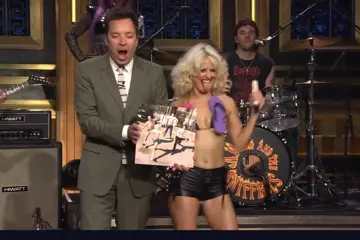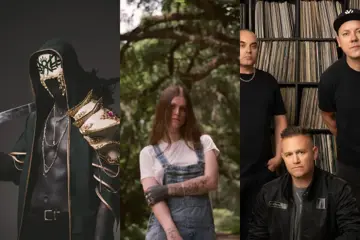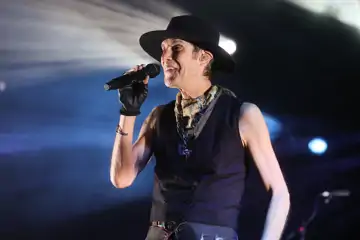The latest instalment in Marvel Comics' world-beating, multi-film universe, Captain America: Civil War, has just wrapped its first week in Australian cinemas. Unsurprisingly, it's been met with broad acclaim from fans and pundits alike, with everything from its story to its effects work gathering praise from various corners.
As the movie stares down its imminent release at home in the States, it's already proving to be everything for fans that the recent Batman V Superman: Dawn Of Justice wasn't — fun, engrossing, intelligent, true to the comics… well, except for that last part.
Although it shares its name with a company-wide crossover event that dominated store shelves 10 years ago, the film Civil War diverges from its comic-book counterpart significantly on several fronts. That's not to say the decision to differentiate was a bad one by any stretch; in fact, the choices made arguably work much better within the context of the film universe Marvel has constructed for itself — and Captain America: Civil War is a magnificent film — but, by the same token, for every scene ripped from the pages, it's also missing several moments that kind of defined the book at the time, like when, I don't know, Spider-Man unmasked publicly for the first time ever.

Again, it's worth reiterating that a lot of these changes made sense within the limits of the universe that has been growing since Robert Downey Jr first donned the red-and-gold in Iron Man back in 2008 — and it's undeniable that the genre's respect for the books from which they take their titles and ideas has grown exponentially since even then — but the same can't be said for some of these other offenders, whose modifications on the way to the big screen ultimately left their film adaptations as little more than curious approximations of something that could have otherwise been really great.
the punisher (1989)
Although Marvel's trigger-happy antihero The Punisher has been done justice at last by way of Jon Bernthal's gripping portrayal on the most recent scene of Netflix's Daredevil, it has been a long and perilous road to on-screen credibility for one Frank Castle.
Because of his inherently violent nature - and extreme philosophy on crime-fighting — The Punisher is a hard character to nail down as someone worth rooting for. Punisher: War Zone tried it in 2008, four years after Thomas Jane and John Travolta had a bash in The Punisher in 2004. Neither of those are especially watchable movies, but at least they put a degree of effort into making the film at least sort of reminiscent of the comics. Unfortunately, the first cinematic Punisher adventure — an eponymous film released in 1989, starring Dolph Lundgren in the title role — was made at a time when studios were fucking up adaptations of everything from He-Man to Howard The Duck, and ol' Franky boy was no exception.
Firstly, you can forget about seeing Castle's iconic skull logo anywhere, or his military history — Dolph's Punisher is your everyday ex-cop, which does nothing at all to explain the special-services precision with which the character is renowned for executing his enemies — and don't even think about strapping in for a no-holds-barred chronicling of one man punching crime in the balls until it surrenders in desperation; rather, watch on as notoriously unfeeling vigilante Frank Castle makes it his mission to rescue a bunch of kidnapped kids from the Yakuza or something.

I'm not claiming to have read every Punisher comic in existence, but I have read a lot of them, and I am pretty sure this is the only time in the character's history that the writers decided a group of imperilled children should feature in a pivotal role. It's not that Frank wouldn't rescue a bunch of kids if he had to — he was a father once, and is not a total monster, after all — it's just that it's not really his general bag.
Call Daredevil, you know? He lives for that shit.
Constantine (2005)
Another character that had a far-more-successful bash on television than at the movies (regardless of whether he only got one season before cancellation), John Constantine has been DC's foremost practitioner of the dark arts for decades now. This made 2005's Constantine all the more baffling when it was released, because it was acting as though nobody had ever heard of the character before — which, outside of comics fans, was probably true — and decided to make a whole mess of unnecessary changes in the process.
Comic-book Constantine, for example, looks like Sting. That is not an arbitrary comparison; his character model was quite literally based on Sting. Spiky blond hair, thick Liverpudlian accent, sweet fashion sense ripped off by Supernatural's Castiel — the makers of the 2005 film turfed it all, except for the character's chain-smoking habit (which, ironically, was the one bit of the character the recent show couldn't depict).
Even if every other little detail about the movie had been translated straight from inked panels, they basically took all the defining traits of their title character and threw them out the window.
And they replaced it with Keanu Reeves.

men in black (1997)
If the truth is out there, Men In Black couldn't be bothered looking for it.
Now, Men In Black is not a bad movie by any stretch, and in many ways — like most of these entries — it remains faithful to the general premise of Aircel Comics' The Men In Black, which originally ran for three issues in 1990, another three issues in 1991 and a final four in 1997 to coincide with the film's release.
Agents Jay and Kay are there, as is Zed, the head-honcho MiB played in the films by the late Rip Torn. And the overall premise of the Men In Black being a covert organisation designed to keep Earth safe from the busy beings of the universe comes along for the ride on the silver screen. Both properties also feature a bug-like alien wreaking havoc on unsuspecting humans.

But what about the part in the books where the Men In Black don't just deal with aliens, but werewolves, zombies, mutants, demons and other paranormal enemies? Were filmmakers worried they might not be able to screw up RIPD later on?
Or the part where an agent known as Ecks goes off-grid after discovering that the MiB are in fact pulling strings for nefarious purposes to better assert their power and control over the people of Earth while keeping them in the dark about extraterrestrial/supernatural activity? What about the open declaration by the organisation that agents may use any means necessary (which, yes, includes offing witnesses, although they still have neuralyzers) to complete their missions?
Yeah, not so much on any of these fronts. Turns out it's preferable to just throw in some "aw hell naw"s and a feelgood hit for the summer charts than to get bogged down in socio-philosophical questions of power and authority that might have laid the framework for a legitimate sci-fi thriller trilogy rather than a trio of vehicles for Will Smith to be able to redo his kitchen.
from hell (2001)
Like most cinematic adaptations of the work of Alan Moore (including films such as The League Of Extraordinary Gentlemen, Watchmen, V For Vendetta), From Hell had everything it needed to be a brilliant film, and Hollywood dropped the ball, big-time. Actually, this could be a blanket entry for "pretty much every movie based on an Alan Moore book".
So displeased was the writer with the resultant film of his celebrated Jack The Ripper tale, starring Johnny Depp as a poor imitation of Moore's hero, Inspector Abberline, that there's little use in conveying the disappointment the book's creator felt in anyone's words other than his own.
As he told MTV in an interview many years ago:
"In Hollywood you're going to have the producers and the backers putting in their ... well, I don't want to dignify them by calling them ideas, but ... having their input, shall we say. You're going to get actors who'll say they don't want to say this line or play this character like that. I mean the police inspector in From Hell, Fred Abberline, was based on real life: He was an unassuming man in middle age who was not a heavy drinker and who, as far as I know, remained faithful to his wife throughout his entire life.
"Johnny Depp saw fit to play this character as an absinthe-swilling, opium-den-frequenting dandy with a haircut that, in the Metropolitan Police force in 1888, would have gotten him beaten up by the other officers."

Not quite what he had in mind, then. Not that the film's lukewarm result did anything to stop Warner Bros and DC's meddling with Moore's work — after From Hell, The League Of Extraordinary Gentlemen also succumbed to the whims of easily excited Hollywood types, and, after being falsely publicised as being "excited" about V For Vendetta (he had, in reality, asked to have his name removed from all materials relating to the movie) ultimately refused to work with "any of this shark pool again".
the mask (1994)
May as well round out with a controversial one. I know that The Mask is cherished by a generation of people who were enamoured by Jim Carrey's rubber-faced antics and all the wacky cartoon sound effects and Royal Crown Revue cameos, but make no mistake — the big-screen The Mask you see before you is the equivalent of taking the Dark Horse Comics original, de-clawing it, filing its teeth down to blunt stumps, injecting it with a casual attitude towards date rape and some old-timey animation tropes, and calling it a day.
But what you mightn't know is just how far they landed from the book that inspired the movie's existence. To start with, the central character of the film — well-meaning, bumbling nice guy Stanley Ipkiss — doesn't even last that long in the comics. He's dead — shot in the back by a jilted girlfriend, freshly imbued with The Mask's powers — within a few issues, because, unlike Carrey's interpretation, the book's Ipkiss actually isn't that redeemable a person. He starts out as a snivelling, mean-spirited little man, and obtaining The Mask doesn't make him suddenly likeable; he's just an asshole who becomes a slightly more abusive asshole, fuelled by a misguided, murderous need for revenge.

In fairness, the film doesn't totally pretend that the Dark Horse comic doesn't exist. There are nods to the book, in the form of the almost panel-for-panel take on the famous 'tommy gun' balloon scene, while Ipkiss' vengeance on a pair of shady mechanics also makes it to the screen, albeit in a far less gruesome form than its printed counterpart — but that's really where the obvious similarities stop.
Even the movie's secondary antagonist, Lieutenant Kellaway, is given a raw deal. The poor guy spends the entire movie as a stressed-out, barely competent cop clearly having the worst year of his life, rather than the cocky, assured, handsome, successful detective he is in the comics, where, oh yeah, he ends up taking on the mantle of The Mask himself following Ipkiss' death, using his powers to run rampant over the city's drug lords and crime bosses at night while being forced to hunt himself during the day as part of an anti-Mask taskforce.
Yeah, it's a way more compelling narrative. If there's a comic-book film that deserves a gritty reboot, it's this one.

Captain America: Civil War is in cinemas now.















